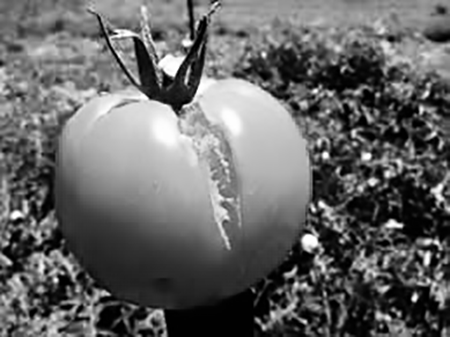
Many tomato problems can be avoided by early detection.
This water logged tomato could have been saved by proper watering or by harvesting before a heavy rainfall.
TOMATOES New Jersey’s favorite
LAST FROST DATE: May 12*
Now that Spring has finally arrived gardeners are itching to get busy planting. For many of us in New Jersey that means TOMATOES. The tomato is native to Central & South America. While its culture is ancient it has only reached its present prominence since the mid-1800s.
Unfortunately, tomatoes can host many diseases that can devastate your harvest just when you are looking forward to it. There are a few things you can do at planting time to help limit the chances that will happen to you.
Egg shells added to the soil can help prevent “Blossom End Rot.” Soak, clean and dry the egg shells. Then grind them in a food processer and add to soil. Dirty egg shells will attract critters to your plot.
Rotate your crops. Plant your tomatoes in a different spot than you planted them last year. This practice prevents diseases that can go into the soil, which can contaminate it for years into the future. If last year you had a tomato problem don’t replant in the same area.
Disease resistant varieties are available. These are marked on the label and your local greenhouse personnel will be able to help you locate them.
Plant several different varieties. Not only will this help prevent disease from infecting all of your plants, it will also give you more flavor and most likely a longer and more bountiful harvest.
Proper and consistent watering will greatly improve your harvest. Tomatoes require less water than you might think. Over-watered tomatoes can lack flavor and meatiness. Although we cannot control rainfall, we should take it into consideration when hand watering. A rain meter, either bought or home-made, can be very helpful. It can be as simple as dipping a ruler into a bucket. Keep it clean to prevent mosquitoes.
Pruning tomatoes and removing suckers will focus plant growth on vegetables rather than unproductive stems and leaves.
Staking up your plants makes it easier to detect problems, harvest your crop and will keep fruit from touching the ground where it can rot. Staking also improves air circulation.
Mulching with black plastic or chopped leaves will control weeds and maintain moisture. This will help keep the soil cool during the heat of summer. Although we know tomatoes like it hot, they stop producing fruit when temperatures reach over 90 degrees. That will greatly diminish your late harvest.
Container gardening is a good choice if you have had disease problems in the past. A simple five-gallon bucket with holes drilled in the bottom can be a good choice for this. This system works best with medium size tomatoes.
For more information on growing tomatoes contact our local Rutgers Cooperative Extension Service Garden Helpline of Union County 908-654-9852
*Save yourself time and money. Do not plant tender flowers or vegetables until after the last frost.
Happy Gardening, James
First Printed in Our Town, May 2014

